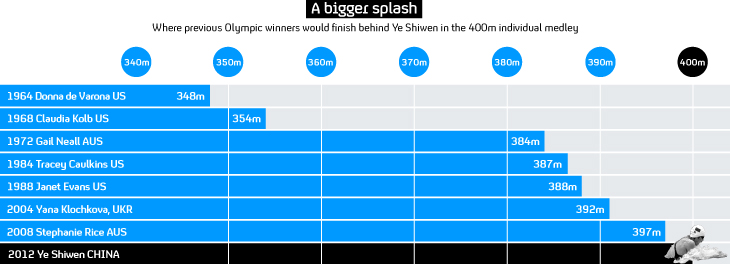Questions over Ye Shiwen’s ‘disturbing’ world record
Chinese gold medallist swimmer Ye Shiwen has denied taking performance-enhancing drugs, after a US swim coach described her world-record win as “disturbing” and “unbelievable”.
American swimming coach and executive director of the World Swimming Coaches Association, John Leonard, said the 16-year-old’s performance in the London 2012 Games was “suspicious”.
He said it was very hard to believe that Ye could swim faster than world number one, US swimmer Ryan Lochte, in her final lap.
“The one thing I will say is that history in our sport will tell you that every time we see something, and I will put quotation marks around this, ‘unbelievable’, history shows us that it turns out later on there was doping involved.
“That last 100m was reminiscent of some old East German swimmers, for people who have been around a while. It was reminiscent of the 400m individual medley by a young Irish woman in Atlanta.”
Irish swimmer Michelle Smith was banned for two years after testing positive for anabolic steroids following her win in the 1996 Atlanta Olympics.
“Every time we see something that is ‘unbelievable’, it turns out later on there was doping involved.” – John Leonard, World Swimming Coaches Association
Leonard added: “Any time someone has looked like superwoman in the history of our sport they have later been found guilty of doping.”
Former world record holder, Australian swimmer Stephanie Rice, described Ye’s performance as “insanely fast”.
‘No problem’
But Ye rejected accusations that she was doping, saying: “The Chinese team keep very firmly to the anti-doping policies, so there is absolutely no problem.”
All medal winners at the Olympics are automatically drug-tested.
The IOC has played down speculation of any potential doping violations by the Chinese swim team.
“You ask me specifically about this particular swimming (event), I say no I haven’t personally any reason to other than applaud what has happened,” IOC medical commission chairman, Arne Ljungqvist said.
“The Chinese team keep very firmly to the anti-doping policies, so there is absolutely no problem.” – Chinese swimmer Ye Shiwen
But he admitted that despite the huge operation to try to catch drug cheats, it’s “virtually impossible” to ensure all athletes are clean.
“There is no way actually in telling whether the games are completely clean or not. If so we should have tested all ten thousand athletes during the lead up to the games, years before even, and that’s virtually impossible as you can see,” Mr Ljungqvist said.
History of doping
Last month, 16-year-old world champion in the 4x100m medley Li Zhesi tested positive for the blood-boosting drug EPO.
During the 1990s, China had 40 swimmers test positive for banned substances and another seven who were caught doping before the Beijing Games.

-
Latest news
-
Taylor Swift’s new break-up album breaks records3m

-
NHS trust fined £200K for failings that led to death of two mental health patients3m

-
Sunak vows to end UK ‘sick note culture’ with benefit reform3m

-
‘Loose talk about using nuclear weapons is irresponsible and unacceptable’, says head of UN’s nuclear watchdog3m

-
‘There wasn’t an Israeli attack on Iran,’ says former adviser to Iran’s nuclear negotiations team7m

-




